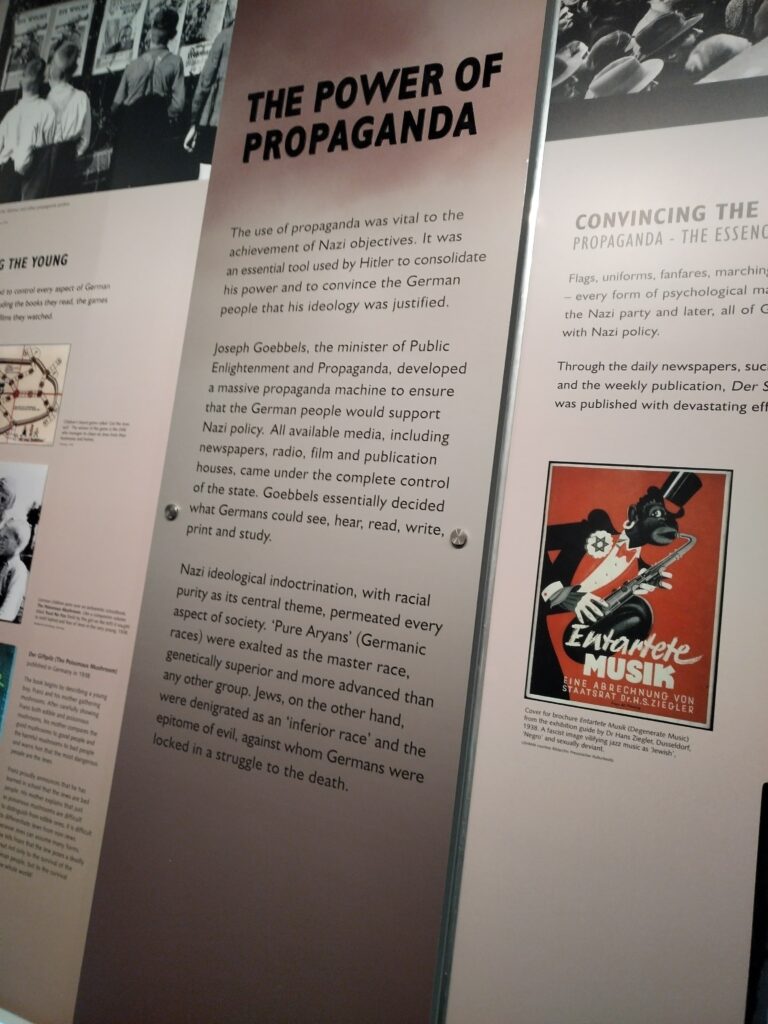The propaganda continues… South Africa
10 april, 2025
If you have learned how South Africans fought against the atrocities of their oppressors and that apartheid and racial segregation were abolished in South Africa, you might be excited to learn what such connotations mean to South Africans. I spent two weeks in Cape Town observing, learning, getting first-hand information from South Africans, and visiting various historical sites. To this day, the power of propaganda has never left my mind!
Hitler used his propaganda to gain enormous support that justified the killing of people. Many people still use such propaganda when asked to describe who a Jew is! During the apartheid era, the propaganda was that South African culture was backward, their language should not be taught in schools, and segregation in schools, churches, jobs and housing was legalized. To my surprise, there is still a huge difference in South Africa between people based on skin colour, which in many cases determines what school, job and area you belong to. I saw that the white areas were safe and spacious in places like Stellenbosch, while the black areas were predominantly ghettoized in places like Langa and Khayamandi. In my opinion, this means that apartheid ended on paper, but the propaganda about the need for white supremacy and their domination of South Africa is the reality that is silenced!

About the Abrahamic religions Christianity, Judaism and Islam. Let me draw a contrast here based on my observations from both Finland and South Africa. As a Ugandan currently living in Finland, I believe that South Africa can learn a lot from Finland in terms of interfaith dialogue and cooperation. When these religions came to Africa, the propaganda made religion seem more important than African culture, which earlier had been the connecting factor that held Africans together. The spirit of brotherhood became limited to the religion to which one belongs. Religious discussions therefore tend to focus on which religion is right, and which one is wrong. Therefore, the motive is to see that the other one is converted, thus ending up in frustrations and leaving no room for meaningful discussions that could be fruitful in promoting better relationships and teamwork in dealing with social challenges. When we had the interfaith dialogue in Finland, the environment was calmer, and the focus was on reading and interpreting scriptures with the aim of learning from each other. This seemed to be a fertile ground that could be used to forge more engagements such as doing charity and joint events or celebrations. In this way trust could eventually be realized.
A thought that has not left my mind regards the continuation of the apartheid. Nelson Mandela, Desmond Tutu and all the other freedom fighters risked their lives, and many died in the struggle for freedom. However, South Africans still live as refugees in the country of their birth – jobs, schools, places of residence are still based on the colour of one’s skin. Equality in South Africa remains a dream. Are there people who do not believe the propaganda that apartheid has ended in South Africa?
The propaganda overshadowed my observations, but I noticed that Muslim women in both Finland and South Africa made incredible efforts to become leaders in their communities. I was fascinated that they could fight the status quo regarding gender: they were full of knowledge in spaces where men and women were involved.
Dorcus Asiimwe
The theological course Abraham Goes Global is a cooperation between Åbo Akademi University and Stellenbosch University (South Africa) funded by the Finnish National Agency for Education and The Polin Institute 2023-2024 and 2024-2025. The aims are to widen the perception of theology to cross boundaries of religion at both universities, to exchange expertise on contextualised forms of religion, and to deepen the students’ and teachers’ understanding of interreligious and intercultural dynamics in religions. This blog text is the sixth of eight blog texts to present reflections of the Finnish students visiting South Africa in January-February 2025.

